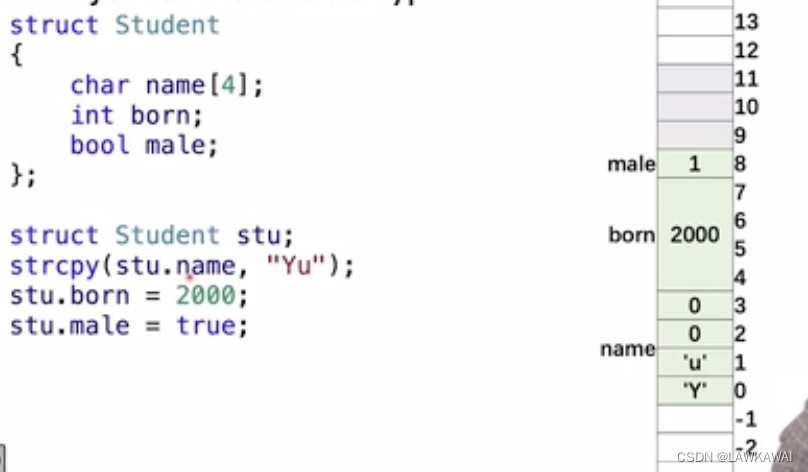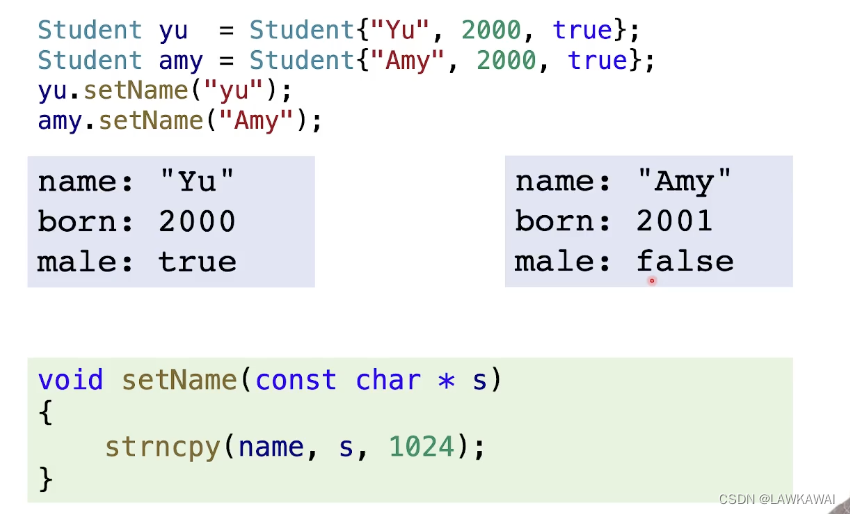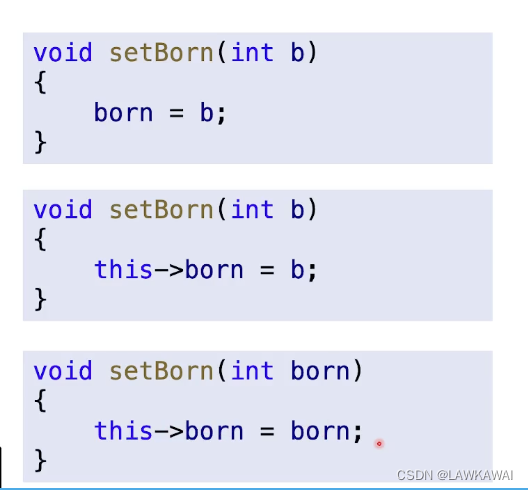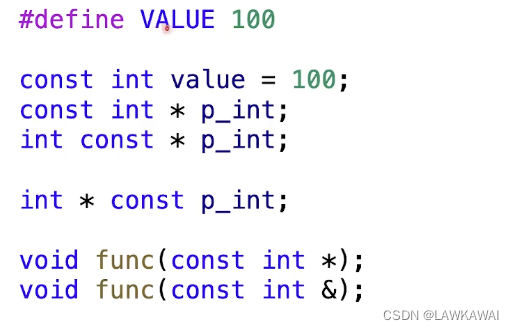【CPP】类和对象
1- Classes and Objects
Structures
- A struct in C is a type consisting of a sequence of data members
- Some functions/Statements are needed to operate the data members of an object of a struct type

不不小心操作错误,不小心越界
Classes
- You should be very careful to manipulated the data members in a struct object
- Can we improve struct to a better one ?
- Yes, it is
class! We can put some member functions in it
class Student
{private:static size_t student_total; // declaration only//inline static size_t student_total = 0; //C++17, definition outside isn't neededchar * name;int born;bool male; void setName(const char * s){strncpy(name, s, sizeof(name));}
};
Student yu;
yu.setName("Yu");
firstclass.cpp
#include <iostream>
#include <cstring>class Student
{public:char name[4];int born;bool male; void setName(const char * s){strncpy(name, s, sizeof(name));}void setBorn(int b){born = b;}void setGender(bool isMale){male = isMale;}void printInfo(){std::cout << "Name: " << name << std::endl;std::cout << "Born in " << born << std::endl;std::cout << "Gender: " << (male ? "Male" : "Female") << std::endl;}
};int main()
{Student yu;yu.setName("Yu");yu.setBorn(2000);yu.setGender(true);yu.born = 2001; // it can also be manipulated directlyyu.printInfo();std::cout << "It's name is " << yu.name << std::endl; return 0;
}
Name: Yu
Born in 2001
Gender: Male
It's name is Yu
Access Specifiers
- You can protect data members by access specifier
private - Then data member can only be accessed by well designed member functions
access_attribute.cpp
#include <iostream>
#include <cstring>class Student
{private:char name[4];int born;bool male; public:void setName(const char * s){strncpy(name, s, sizeof(name));}void setBorn(int b){born = b;}void setGender(bool isMale){male = isMale;}void printInfo(){std::cout << "Name: " << name << std::endl;std::cout << "Born in " << born << std::endl;std::cout << "Gender: " << (male ? "Male" : "Female") << std::endl;}
};int main()
{Student yu;yu.setName("Yu");yu.setBorn(2000);yu.setGender(true);yu.born = 2001; // you cannot access a private memberyu.printInfo();return 0;
}
access-attribute.cpp:37:8: error: 'born' is a private member of 'Student'yu.born = 2001; // you cannot access a private member^
access-attribute.cpp:8:9: note: declared private hereint born;^
Member Functions
- A member function can be defined inside or outside class
- 如果在类内部实现函数则就是
inline函数
function.cpp
#include <iostream>
#include <cstring>class Student
{private:char name[4];int born;bool male; public:void setName(const char * s){strncpy(name, s, sizeof(name));}void setBorn(int b){born = b;}// the declarations, the definitions are out of the classvoid setGender(bool isMale);void printInfo();
};void Student::setGender(bool isMale)
{male = isMale;
}
void Student::printInfo()
{std::cout << "Name: " << name << std::endl;std::cout << "Born in " << born << std::endl;std::cout << "Gender: " << (male ? "Male" : "Female") << std::endl;
}int main()
{Student yu;yu.setName("Yu");yu.setBorn(2000);yu.setGender(true);yu.printInfo();return 0;
}
Name: Yu
Born in 2000
Gender: Male
File Structures
- The source code can be placed into multiple files
student.hpp
#pragma once#include <cstring>
class Student
{private:char name[4];int born;bool male; public:void setName(const char * s){strncpy(name, s, sizeof(name));}void setBorn(int b){born = b;}// the declarations, the definitions are out of the classvoid setGender(bool isMale);void printInfo();
};student.cpp
#include <iostream>
#include "student.hpp"void Student::setGender(bool isMale)
{male = isMale;
}
void Student::printInfo()
{std::cout << "Name: " << name << std::endl;std::cout << "Born in " << born << std::endl;std::cout << "Gender: " << (male ? "Male" : "Female") << std::endl;
}如果include <> 从编译器路径查找,如果是include "" 从编译器和当前目录找
main.cpp
#include "student.hpp"int main()
{Student yu;yu.setName("Yu");yu.setBorn(2000);yu.setGender(true);yu.printInfo();return 0;
}CMakeList.txt
cmake_minimum_required(VERSION 3.12)project(persondemo)ADD_EXECUTABLE(persondemo main.cpp student.cpp)cd multi-files
mkdir build
cd build
cmake ..
make
./persondemo
Name: Yu
Born in 2000
Gender: Male
2-Constructors and Destructors
Constructors
- Different from
structin C, a constructor will be invoked when creating an object of aclass
(1) struct in C: allocate memory
(2) class in C++: allocate memory & invoke a constructor
- But, No constructor is defined explicitly in previous examples
(1) the compiler wil generate one with empty body
如果没有人为定义构造函数,则自动会有一个空的构造函数
- The same name with the class
- Have no return value
class Student
{private:char name[4];int born;bool male; public:Student(){name[0] = 0;born = 0;male = false;cout << "Constructor: Person()" << endl;}}Student(const char * initName, int initBorn, bool isMale){setName(initName);born = initBorn;male = isMale;cout << "Constructor: Person(const char, int , bool)" << endl;}
}
- The members can also be initialized as follows
Student(const char * initName): born(0), male(true){setName(initName);cout << "Constructor: Person(const char*)" << endl;}
把成员变量born 初始化为0 , 把male 初始化为true
constructor.cpp
#include <iostream>
#include <cstring>using namespace std;class Student
{private:char name[4];int born;bool male; public:Student(){name[0] = 0;born = 0;male = false;cout << "Constructor: Person()" << endl;}Student(const char * initName): born(0), male(true){setName(initName);cout << "Constructor: Person(const char*)" << endl;}Student(const char * initName, int initBorn, bool isMale){setName(initName);born = initBorn;male = isMale;cout << "Constructor: Person(const char, int , bool)" << endl;}void setName(const char * s){strncpy(name, s, sizeof(name));}void setBorn(int b){born = b;}// the declarations, the definitions are out of the classvoid setGender(bool isMale);void printInfo();
};void Student::setGender(bool isMale)
{male = isMale;
}
void Student::printInfo()
{std::cout << "Name: " << name << std::endl;std::cout << "Born in " << born << std::endl;std::cout << "Gender: " << (male ? "Male" : "Female") << std::endl;
}int main()
{Student yu;yu.printInfo();yu.setName("Yu");yu.setBorn(2000);yu.setGender(true);yu.printInfo();Student li("li");li.printInfo();Student xue = Student("XueQikun", 1962, true);//a question: what will happen since "XueQikun" has 4+ characters?xue.printInfo();Student * zhou = new Student("Zhou", 1991, false);zhou->printInfo();delete zhou;return 0;
}
Constructor: Person()
Name:
Born in 0
Gender: Female
Name: Yu
Born in 2000
Gender: Male
Constructor: Person(const char*)
Name: li
Born in 0
Gender: Male
Constructor: Person(const char, int , bool)
Name: XueQ�
Born in 1962
Gender: Male
Constructor: Person(const char, int , bool)
Name: Zhou�
Born in 1991
Gender: Female
Destructors
- The destructor will be invoked when the object is destroyed
- Be formed from the class name preceded by a tilde(~)
- Have no return value, no parameters
~Student(){cout << "To destroy object: " << name << endl;delete [] name;}
析构函数只能有一个
析构函数常做的事情:释放内存,关闭文件,断掉网络etc
destructor.cpp
#include <iostream>
#include <cstring>using namespace std;class Student
{private:char * name;int born;bool male; public:Student(){name = new char[1024]{0};born = 0;male = false;cout << "Constructor: Person()" << endl;}Student(const char * initName, int initBorn, bool isMale){name = new char[1024];setName(initName);born = initBorn;male = isMale;cout << "Constructor: Person(const char, int , bool)" << endl;}~Student(){cout << "To destroy object: " << name << endl;delete [] name;}void setName(const char * s){strncpy(name, s, 1024);}void setBorn(int b){born = b;}// the declarations, the definitions are out of the classvoid setGender(bool isMale);void printInfo();
};void Student::setGender(bool isMale)
{male = isMale;
}
void Student::printInfo()
{std::cout << "Name: " << name << std::endl;std::cout << "Born in " << born << std::endl;std::cout << "Gender: " << (male ? "Male" : "Female") << std::endl;
}int main()
{{Student yu;yu.printInfo();yu.setName("Yu");yu.setBorn(2000);yu.setGender(true);yu.printInfo();}Student xue = Student("XueQikun", 1962, true);xue.printInfo();Student * zhou = new Student("Zhou", 1991, false);zhou->printInfo();delete zhou;return 0;
}
g++ destructor.cpp --std=c++11
Constructor: Person()
Name:
Born in 0
Gender: Female
Name: Yu
Born in 2000
Gender: Male
To destroy object: Yu
Constructor: Person(const char, int , bool)
Name: XueQikun
Born in 1962
Gender: Male
Constructor: Person(const char, int , bool)
Name: Zhou
Born in 1991
Gender: Female
To destroy object: Zhou
To destroy object: XueQikun
人工手动调用析构函数 delete zhou,作用域结束跳出也会自动调用析构函数
如果对于new 的对象不进行手动删除delete 则作用域结束也不会动态调用析构函数,造成内存泄漏
Student * class1 = new Student[3]{{"Tom", 2000, true},{"Bob", 2001, true},{"Amy", 2002, false},};
- What is the different between the following two lines?
delete class1;
delete [] class1;
array.cpp
#include <iostream>
#include <cstring>using namespace std;class Student
{private:char * name;int born;bool male; public:Student(){name = new char[1024]{0};born = 0;male = false;cout << "Constructor: Person()" << endl;}Student(const char * initName, int initBorn, bool isMale){name = new char[1024];setName(initName);born = initBorn;male = isMale;cout << "Constructor: Person(const char, int , bool)" << endl;}~Student(){cout << "To destroy object: " << name << endl;delete [] name;}void setName(const char * s){strncpy(name, s, 1024);}void setBorn(int b){born = b;}// the declarations, the definitions are out of the classvoid setGender(bool isMale);void printInfo();
};void Student::setGender(bool isMale)
{male = isMale;
}
void Student::printInfo()
{std::cout << "Name: " << name << std::endl;std::cout << "Born in " << born << std::endl;std::cout << "Gender: " << (male ? "Male" : "Female") << std::endl;
}int main()
{Student * class1 = new Student[3]{{"Tom", 2000, true},{"Bob", 2001, true},{"Amy", 2002, false},};class1[1].printInfo();delete class1;delete []class1;return 0;
}
Constructor: Person(const char, int , bool)
Constructor: Person(const char, int , bool)
Constructor: Person(const char, int , bool)
Name: Bob
Born in 2001
Gender: Male
To destroy object: Tom
数组调用析构函数delete class1 , 只会调用第一个对象的析构函数,后面的对象不会被调用
数组调用析构函数 delete [] class1,则会调用全部对象的析构函数
Constructor: Person(const char, int , bool)
Constructor: Person(const char, int , bool)
Constructor: Person(const char, int , bool)
Name: Bob
Born in 2001
Gender: Male
To destroy object: Amy
To destroy object: Bob
To destroy object: Tom
3-this pointer
Why is this needed
- How does a member function know which name?

this Pointer
- All methods in a function have a
thispointer - It is set to the address of the object that invokes the method

this.cpp
#include <iostream>
#include <cstring>using namespace std;class Student
{private:char * name;int born;bool male; public:Student(){name = new char[1024]{0};born = 0;male = false;cout << "Constructor: Person()" << endl;}Student(const char * name, int born, bool male){this->name = new char[1024];this->setName(name);this->born = born;this->male = male;cout << "Constructor: Person(const char, int , bool)" << endl;}~Student(){cout << "To destroy object: " << name << endl;delete [] name;}void setName(const char * name){strncpy(this->name, name, 1024);}void setBorn(int born){this->born = born;}// the declarations, the definitions are out of the classvoid setGender(bool isMale);void printInfo();
};void Student::setGender(bool isMale)
{male = isMale;
}
void Student::printInfo()
{std::cout << "Name: " << name << std::endl;std::cout << "Born in " << born << std::endl;std::cout << "Gender: " << (male ? "Male" : "Female") << std::endl;
}int main()
{Student * class1 = new Student[3]{{"Tom", 2000, true},{"Bob", 2001, true},{"Amy", 2002, false},};class1[1].printInfo();delete []class1;return 0;
}
Constructor: Person(const char, int , bool)
Constructor: Person(const char, int , bool)
Constructor: Person(const char, int , bool)
Name: Bob
Born in 2001
Gender: Male
To destroy object: Amy
To destroy object: Bob
To destroy object: Tom
4- const and static Members
const Variables
- statements for constants

C++不推荐用 宏
const Members
constmember variables behavior similar with normal const variablesconstmember functions promise not to modify member variables
class Student
{private:const int BMI = 24;public:Student(){BMI = 25;//can it be modified?int getBorn() const{born++; //Can it be modified?return born;}
};
常量函数,const 放在后面,不然跟前面的const int相冲突。不可以修改成员变量,born 是不可以被修改的,保证不修改函数里的变量
const.cpp
#include <iostream>
#include <cstring>using namespace std;class Student
{private:const int BMI = 24;char * name;int born;bool male; public:Student(){name = new char[1024]{0};born = 0;male = false;// BMI = 25;//can it be modified?cout << "Constructor: Person()" << endl;}Student(const char * name, int born, bool male){this->name = new char[1024];setName(name);this->born = born;this->male = male;cout << "Constructor: Person(const char, int , bool)" << endl;}~Student(){cout << "To destroy object: " << name << endl;delete [] name;}void setName(const char * name){strncpy(this->name, name, 1024);}void setBorn(int born){this->born = born;}int getBorn() const{//born++; //Can it be modified?return born;}// the declarations, the definitions are out of the classvoid setGender(bool isMale);void printInfo();
};void Student::setGender(bool isMale)
{male = isMale;
}
void Student::printInfo()
{std::cout << "Name: " << name << std::endl;std::cout << "Born in " << born << std::endl;std::cout << "Gender: " << (male ? "Male" : "Female") << std::endl;
}int main()
{Student yu("Yu", 2000, true);cout << "yu.getBorn() = " << yu.getBorn() << endl;return 0;
}
Constructor: Person(const char, int , bool)
yu.getBorn() = 2000
To destroy object: Yu
static members
staticmembers are not bound to class instances
class Student
{private:static size_t student_total; // declaration onlypublic:Student(){student_total++;}~Student(){student_total--;}static size_t getTotal() {return student_total;}
};// definition it here
size_t Student::student_total = 0; 静态成员不绑定在类对象上,只有一个
static.cpp
#include <iostream>
#include <cstring>using namespace std;class Student
{private:static size_t student_total; // declaration only//inline static size_t student_total = 0; //C++17, definition outside isn't neededchar * name;int born;bool male; public:Student(){student_total++;name = new char[1024]{0};born = 0;male = false;cout << "Constructor: Person(): student_total = " << student_total << endl;}Student(const char * initName, int initBorn, bool isMale){student_total++;name = new char[1024];setName(initName);born = initBorn;male = isMale;cout << "Constructor: Person(const char, int , bool): student_total = " << student_total << endl;}~Student(){student_total--;cout << "To destroy object: " << name ;cout << ". Then " << student_total << " students are left" << endl;delete [] name;}void setName(const char * s){strncpy(name, s, 1024);}void setBorn(int b){born = b;}static size_t getTotal() {return student_total;}// the declarations, the definitions are out sof the classvoid setGender(bool isMale);void printInfo();
};void Student::setGender(bool isMale)
{male = isMale;
}
void Student::printInfo()
{std::cout << "Name: " << name << std::endl;std::cout << "Born in " << born << std::endl;std::cout << "Gender: " << (male ? "Male" : "Female") << std::endl;
}size_t Student::student_total = 0; // definition it hereint main()
{cout << "---We have " << Student::getTotal() << " students---" << endl;Student * class1 = new Student[3]{{"Tom", 2000, true},{"Bob", 2001, true},{"Amy", 2002, false},};cout << "---We have " << Student::getTotal() << " students---" << endl;Student yu("Yu", 2000, true);cout << "---We have " << Student::getTotal() << " students---" << endl;class1[1].printInfo();delete []class1;cout << "---We have " << Student::getTotal() << " students---" << endl;return 0;
}
---We have 0 students---
Constructor: Person(const char, int , bool): student_total = 1
Constructor: Person(const char, int , bool): student_total = 2
Constructor: Person(const char, int , bool): student_total = 3
---We have 3 students---
Constructor: Person(const char, int , bool): student_total = 4
---We have 4 students---
Name: Bob
Born in 2001
Gender: Male
To destroy object: Amy. Then 3 students are left
To destroy object: Bob. Then 2 students are left
To destroy object: Tom. Then 1 students are left
---We have 1 students---
To destroy object: Yu. Then 0 students are left
静态函数里面不可以修改非静态数据
